SNSの矢とは?
この風刺画について
この風刺画は現代のSNS社会における心の疲弊をテーマに描いた作品です。
「SNSの矢(SNS Arrows)」というタイトルは、まるで感情や承認欲求を射抜いてくる矢のように、SNSからの影響が私たちに刺さってくる様子を比喩的に表現しています。
風刺画では真ん中で泣き叫ぶキャラクターたちを配置しました。
彼らはスマートフォンの通知や「いいね」、「フォロワー数」など、見えない圧力に押しつぶされていく象徴です。
それぞれのキャラに刺さっている矢にはFacebook、Twitter、Instagram、LINE、YouTubeなどのアイコンで、これらは日常的に使われるSNSの象徴でもあります。
本来、SNSは人とつながるためのツールであり、楽しさや利便性を提供してくれるはずの存在です。
しかし、情報過多や比較文化、常に何かを発信し続けなければならない焦燥感などが、人々の心に負担をかけている現実も否めません。
そんな矛盾したSNSの側面をユーモアと悲哀を交えてビジュアル化することで、現代人が抱える「見えない痛み」を可視化したいと思いました。
特に意識したのは、あえて可愛らしくポップなイラストにすることで、誰もが抱えるSNSとの距離感をやわらかく提示することです。
見る人が「これ、自分のことかも」と感じてくれたら、この風刺画の意味が届いた証拠だと思っています。
風刺画のポイント
この風刺画には、複数のメッセージと工夫を込めています。
まず第一に注目していただきたいのは、キャラクターの表情とポーズです。
女の子だけでなく3人とも涙を流し、うずくまったり立ちすくんだりしており、精神的な疲弊や混乱を表しています。
これは、SNSによる承認欲求の消耗や、批判・炎上といったネガティブな側面を暗示しています。
矢の本数が多いことにも意味があります。
「1つ1つのSNS通知は小さな刺激でも、積み重なることで心に大きなダメージを与える」というメッセージを込めました。
また、矢の先にハートマークやアイコンがあることで、「一見ポジティブに見えるものが、時として人を傷つける」というSNS特有の逆説的な性質を象徴しています。
そして背景色の使い分けも意識しました。
TOPの3つが並ぶ風刺画に関して言えば、左はベージュ系で孤独感、中央は青空で一見開放的だけれど実は苦しい状態、右は純白で清潔感があるようで矢がより際立つ効果を狙っています。
これは、SNSの表向きの明るさと、内面にある苦しさのギャップを視覚的に表現したものです。
この風刺画は単なるSNS批判ではありません。
むしろ「どのようにSNSと向き合えば、心の矢を防げるのか」という問いかけを視聴者に投げかける意図があります。
時にはSNSを休むことも、自分自身を守る大切な手段です。
そして、自分と他人を比較しすぎず、自分なりの価値観でSNSを使いこなすことこそが、現代社会における生き方のヒントになるのではないでしょうか。
AIが描いた「SNSの矢」
AIが描いたイメージ(画像)
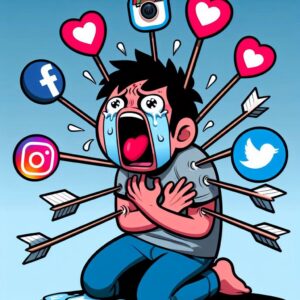 |
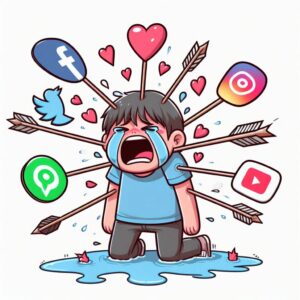 |
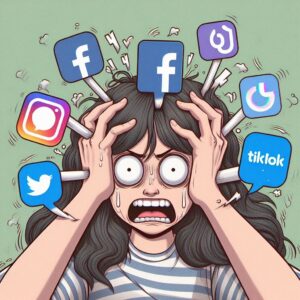 |
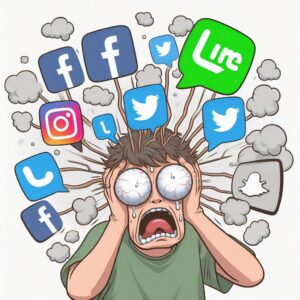 |
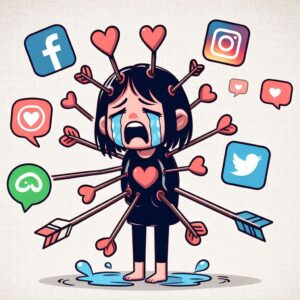 |

コメント